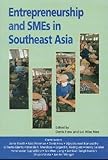Entrepreneurship and SMEs in Southeast Asia / ed. by Denis Hew Wei-Yen, Loi Wee Nee.
Material type: TextPublisher: Singapore : ISEAS Publishing, [2004]Copyright date: ©2004Description: 1 online resource (244 p.)Content type:
TextPublisher: Singapore : ISEAS Publishing, [2004]Copyright date: ©2004Description: 1 online resource (244 p.)Content type: - 9789812302519
- 9789812306197
- 338.040959
- HD2346.A785 A22 2004
- online - DeGruyter
| Item type | Current library | Call number | URL | Status | Notes | Barcode | |
|---|---|---|---|---|---|---|---|
 eBook
eBook
|
Biblioteca "Angelicum" Pont. Univ. S.Tommaso d'Aquino Nuvola online | online - DeGruyter (Browse shelf(Opens below)) | Online access | Not for loan (Accesso limitato) | Accesso per gli utenti autorizzati / Access for authorized users | (dgr)9789812306197 |
Frontmatter -- Contents -- List of Tables -- List of Figures -- Acknowledgements -- Contributors -- Foreword -- 1. Introduction: Entrepreneurship and SMEs in Southeast Asia’s Economic Development -- 2. Entrepreneurial Development: The Necessary Conditions -- 3. SMEs in Southeast Asia since the Asian Financial Crisis -- 4. Financing SMEs in Southeast Asia During the Crisis Period: The Cases of Thailand and Malaysia -- 5. An Overview of Donors’ Role in SME Development in Southeast Asia after the Crisis -- 6. Strengthening SMEs in Southeast Asia’s Agricultural Sector -- 7. The Development of SME Clusters in Indonesia -- 8. Entrepreneurship in Malaysia’s Electronics Industry: The Role of SMEs -- 9. Government’s Role in Developing Entrepreneurship and SMEs in the Philippines -- 10. SME Policies and SME Linkage Development in Singapore -- 11. SME Development in Thailand’s Automotive Industry -- 12. Developing Entrepreneurship and SMEs in Southeast Asia’s Transitional Economies
restricted access online access with authorization star
http://purl.org/coar/access_right/c_16ec
Economic development in Southeast Asia was until recently largely driven by multinational corporations and by strategies that favoured foreign direct investment. However, the financial crisis of 1997-98 and the subsequent regional economic slowdown in 2001 forced policy-makers to re-evaluate their economic policies. This study looks at the increasingly important role of entrepreneurship and small and medium enterprises (SMEs) as agents of development. The book also focuses on the new policy initiatives by the different governments as they address the issues affecting the development of SMEs themselves.
Mode of access: Internet via World Wide Web.
In English.
Description based on online resource; title from PDF title page (publisher's Web site, viewed 01. Dez 2022)


